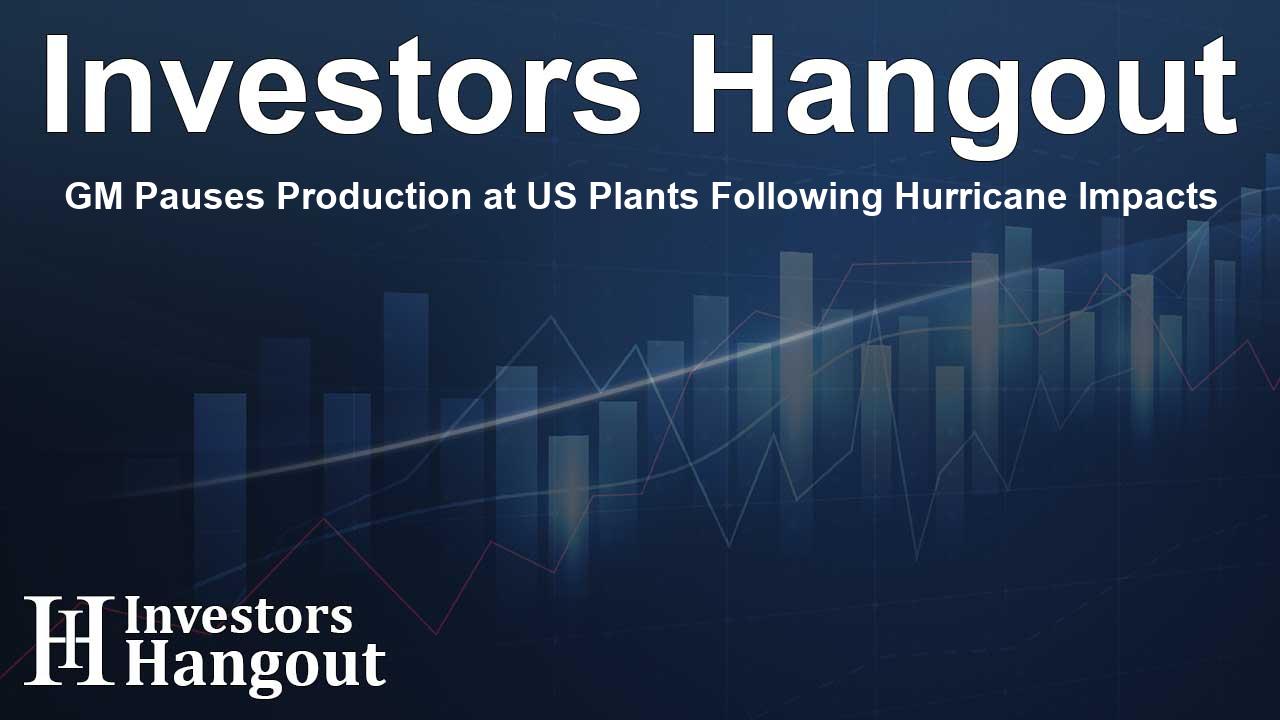GM Pauses Production at US Plants Following Hurricane Impacts

GM Halts Production Following Hurricane Helene's Impact
General Motors (NYSE: GM) has made the decision to temporarily cease vehicle production at two of its factories in the United States. This action stems from significant disruptions faced by its suppliers due to the adverse effects of Hurricane Helene.
Understanding the Reason Behind the Halt
The impact of Hurricane Helene has been felt across several areas, affecting suppliers that are crucial to GM's production processes. In such situations, when the supply chain faces setbacks, companies often have to make challenging decisions to ensure the overall efficiency of their operations. GM’s pause in production reflects a proactive approach to manage these unexpected challenges and maintain quality standards.
The Impact on Production and Supply Chain
When a major hurricane strikes, the ramifications can ripple throughout the industry. Not only does it affect the immediate environment, but it can also disrupt logistics and supply chains that are vital for automotive manufacturing. In GM's case, halting production is likely a strategic move to minimize losses and prepare for resuming operations once the situation stabilizes.
Future Prospects for GM
As GM navigates this tumultuous period, it’s crucial for the company to evaluate its alternatives for maintaining production levels. This could involve seeking alternative suppliers or adjusting production schedules once conditions improve. Analysts have noted that resource flexibility and quick adaptations are essential for recovery in times of crisis.
Responding to External Challenges
In the face of natural disasters, companies like GM are often tested for their resilience. This halt may open discussions internally regarding risk management and improvement strategies for the future. By learning from these experiences, GM can bolster its capabilities to withstand similar challenges down the line.
Conclusion
The decision by General Motors to pause production in light of Hurricane Helene demonstrates the vulnerability of even the largest manufacturers to natural events. However, it also showcases the company’s readiness to adapt swiftly in the face of adversity. Observers will be keen to see how GM recovers once conditions normalize and how they plan to mitigate similar risks in the future.
Frequently Asked Questions
Why did GM halt vehicle production?
GM halted production due to disruptions in its supply chain caused by Hurricane Helene affecting suppliers.
How many plants are affected by this decision?
Two of GM's U.S. factories are currently affected by the production halt.
What measures does GM take during natural disasters?
GM evaluates supplier capabilities and may seek alternative sources to maintain production when facing natural disasters.
How long is the production halt expected to last?
The duration of the production halt largely depends on the recovery of affected suppliers and the overall stabilization of conditions.
What is the significance of this decision for GM's future?
This decision highlights GM's adaptability and willingness to manage risks, which are crucial for long-term sustainability in their operations.
About Investors Hangout
Investors Hangout is a leading online stock forum for financial discussion and learning, offering a wide range of free tools and resources. It draws in traders of all levels, who exchange market knowledge, investigate trading tactics, and keep an eye on industry developments in real time. Featuring financial articles, stock message boards, quotes, charts, company profiles, and live news updates. Through cooperative learning and a wealth of informational resources, it helps users from novices creating their first portfolios to experts honing their techniques. Join Investors Hangout today: https://investorshangout.com/
Disclaimer: The content of this article is solely for general informational purposes only; it does not represent legal, financial, or investment advice. Investors Hangout does not offer financial advice; the author is not a licensed financial advisor. Consult a qualified advisor before making any financial or investment decisions based on this article. The author's interpretation of publicly available data shapes the opinions presented here; as a result, they should not be taken as advice to purchase, sell, or hold any securities mentioned or any other investments. The author does not guarantee the accuracy, completeness, or timeliness of any material, providing it "as is." Information and market conditions may change; past performance is not indicative of future outcomes. If any of the material offered here is inaccurate, please contact us for corrections.